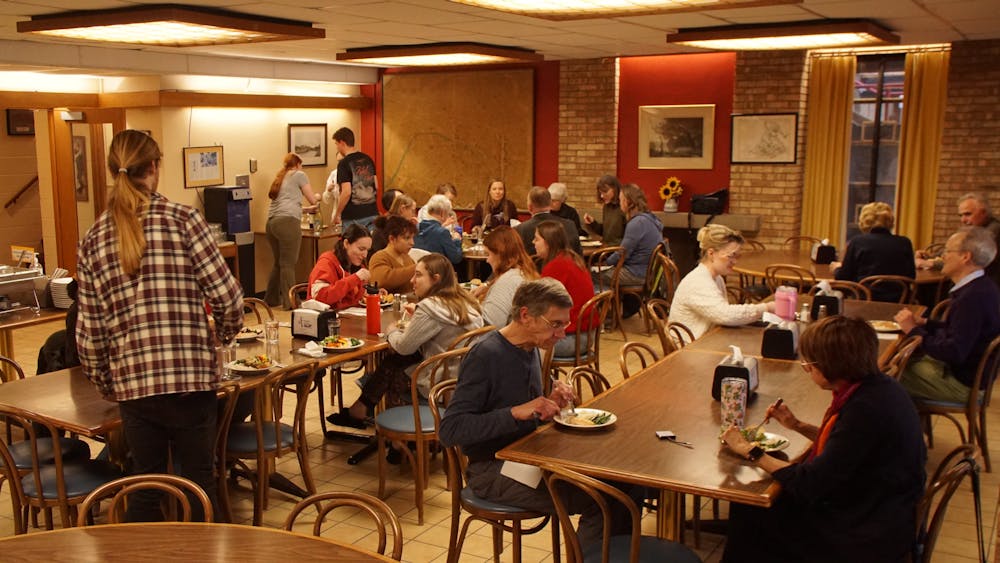With over 50,000 students in a city of almost 270,000 people, the University of Wisconsin-Madison campus is far from isolated.
UW-Madison organizations and recreational spaces serve community members — alumni, Madison residents and those who live nearby — far beyond the student body, allowing students and Madisonians to create a synergetic space regardless of age or background.
At the Bakke Recreation Center, for example, programs aren’t just for students. The rec center embraces community outreach efforts to bridge the gap between UW-Madison’s students and the wider Madison community.
“We’re always doing outreach into the community by bringing programming to spaces outside our facilities,” said Sarah Barnes, associate director of marketing and communications for RecWell. “[There’s] a group fitness instructor on the Union Terrace teaching yoga, a workplace workout at the Department of Chemistry, or a meditation class in the Engineering building.”
Exercising connection
Older people are a target demographic for some of the university’s outreach programs. The Bakke also caters specific classes offered at the gym to older folks and those with limited mobility to encourage involvement within the facility.
Seniors make up 12.8% of Madison’s population, according to 2020 census data. RecWell’s Gold Fitness classes are tailor-made for older folks, offering low-impact sessions with modified movements and exercises, including zumba, yoga and strength workouts.
Tony Vandermuss, a Madison resident, attended his second Strength Gold class this month. Vandermuss said he believes the activity is a way to switch up his day-to-day work routine.
“The first time I was here, there were five people. Today there were just two of us,” Vandermuss said. Despite a smaller class size, he says the classes are feeling “so far, so good.”
On the opposite side of the spectrum, Madison youth also find space for activities at RecWell facilities.
“RecWell offers a variety of youth programs such as day camps, summer camps and various lessons such as swimming and tennis,” John Offerman, assistant director of fitness at RecWell, said via email.
Apart from memberships given to students alongside tuition by the university, RecWell currently provides around 900 community members with memberships, according to Offerman.
A global connection
A lakeside house off Langdon Street has offered a friendly “bienvenue” to Madison students and residents for over a century.
The French House, a residence with history and culture etched in its walls, acts as a space for French language and culture immersion, providing meals, conversations and various educational opportunities, like monthly educational conferences and a running film series. French literature fills the shelves and French-style paintings watch over a space where residents share stories.
“We have two public meals — Wednesday evening and Fridays at noon — where any students and members from the community can come and enjoy a meal and speak French,” said Anne Theobald, director of the French House.
French speakers at the house have a range of levels, she said.
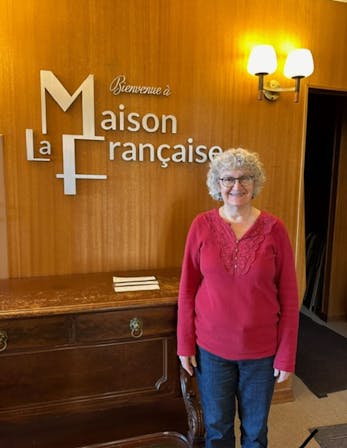
“We have native French speakers, people who are just beginning to speak French and others who have studied French for a while,” Theobald said. “It’s really just meant for anyone interested in speaking French.”
That includes Madison community members from France or other Francophone countries, Theobald said.
“In a way, it’s home for them because they can speak their native language and share their experiences with students learning French,” Theobald said.
Pam Robbins has been a Madison community member since she moved to the city in 1990. She said she discovered the French House from a UW-Madison events website.
Robbins said her ties to the language don’t stem from ethnic roots, but rather an interest in the culture of people around her.
“My father-in-law was very involved in the French resistance, so French was always a part of the family history,” Robbins said. “My favorite part about talking with the students there is being able to draw out people in a language that is not their first language.”
Onto plates
College campuses can have outsized fiscal and political impacts on the cities they’re in. Many universities have turned an eye toward how they can serve communities through shared spaces or services.
“Community outreach, community engagement and community service are central to the university's guiding principle, the Wisconsin Idea, which sets forth that education should influence people’s lives beyond the boundaries of the classroom,” UW-Madison Media Relations and Strategic Communications Director Kelly Tyrrell said in an email.
Tyrrell said the university's South Madison Partnership and the Morgridge Center for Public Service reflect these ideas to foster mutually beneficial relationships. Class projects, internships and other extracurricular opportunities are meant to help students “make lives better for people,” Tyrrell said.
That’s true at Slow Food UW, a student-run food access nonprofit that offers locally sourced meals twice a week at affordable prices. The basement of The Crossing on University Avenue finds itself filled with lights, laughter and conversation from students and community members on Monday evenings and Wednesday afternoons.
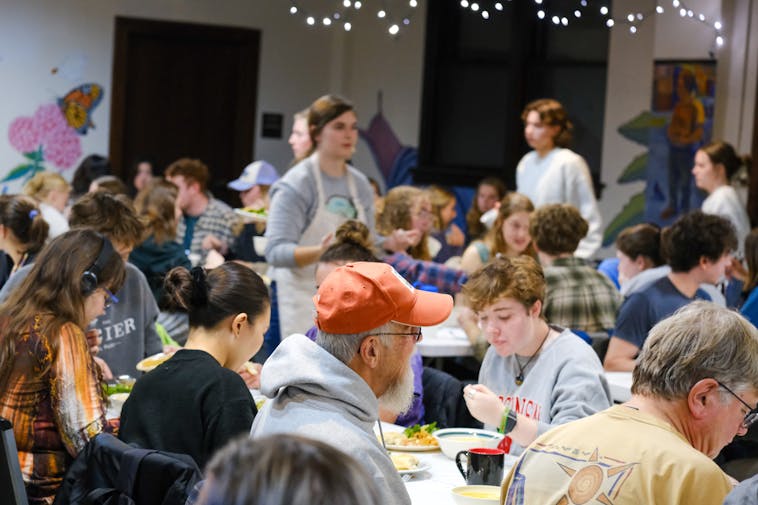
Volunteers and interns fill a kitchen, preparing a hearty three-course meal for guests before filtering out to find a spot of their own to share a table with company.
“Our mission is good, clean, fair food for all,” said Celeste Kim, a UW-Madison senior and Slow Food co-director. Kim said the organization sources food locally through community partnerships with the Willy Street Co-op and local farmers.
“That definitely bridges our connection to the community,” she added. “We have a long-standing relationship with those local farmers in the area.”
The Willy Street Co-op works with various local farms to source Slow Food’s eggs and meat alongside other fresh products. Specialty products like honey come from smaller local farms.
The organization relies on students, community members and past members who stick around after graduating to continue dishing up creative menus on a volunteer basis. There’s also an alumni group for members who transitioned from volunteering at Slow Food to working within Madison’s local food system.
Ben Anderson first heard about the organization during his graduate program at UW-Madison, where he said everybody in his lab encouraged him to join in on Slow Food’s Family Dinner Night on Mondays. He also volunteered as an intern last year.
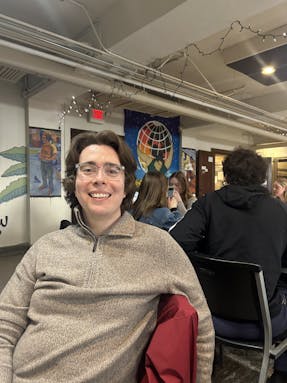
Anderson said attending Slow Food meals once or twice a week allows him to step away from his day-to-day routine and share a space with people simply appreciating good food and welcoming company.
“It’s just nice to be around people in this low-pressure environment eating a meal. Everyone here is obviously super happy. There’s lots of chatter,” Anderson said.
Susan Skubal, a Madison citizen, said she knew of Slow Food before it was affiliated with the university in 2007.
“Madison had a national Slow Food group,” Skubal said. “They were doing these more vegan and vegetarian meals that were really affordable.”
Today, Slow Food’s meals are still at price points its members hope makes meals available to all. The organization uses a pay-it-forward program, allowing those struggling financially to enjoy a meal free of charge thanks to donations.
Aside from the meals, Skubal’s favorite part of the Slow Food experience is the opportunity to connect with the younger people and those in the meal space’s crowd.
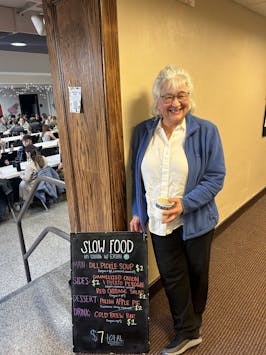
“Everybody that I’ve met over the years, like Celeste, Angie before her, Nico — I now even listen to his Thursday radio show on WSUM,” Skubal said. “I love the communal tables. You meet people, and now they’re friends.”
Chairs slide from table to table, pulled up and away to join in on conversation and make new introductions. Skubal said these table-made connections at Slow Food go back to the core of how she views food.
“Well-raised, local, supporting the community, keeping money in the community — it’s just the best,” Skubal added.

